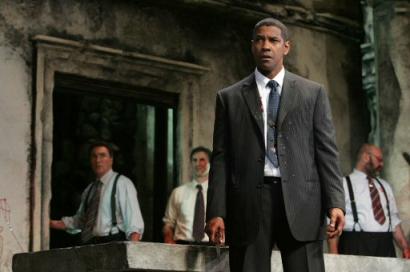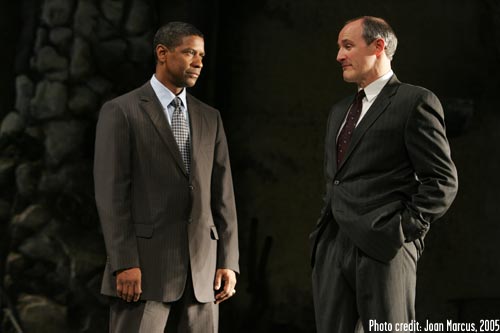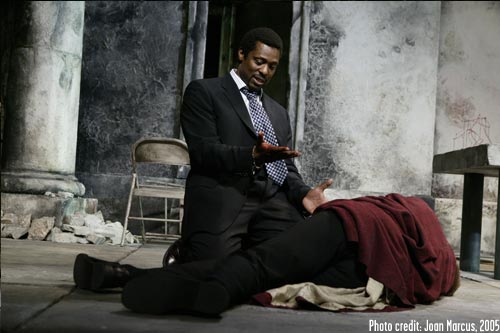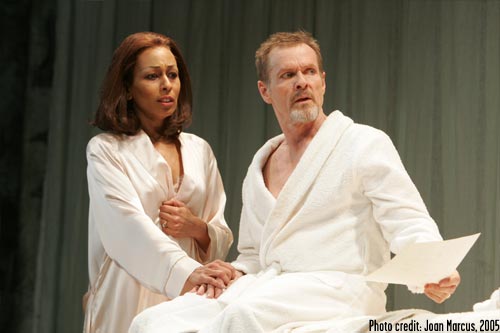“‘A post-war occupation of Iraq could lead to a protracted and costly nation-building exercise.’ The authors add, ‘As already made clear, the U.S. military plans are virtually silent on this point.’” Using the Dubya administration’s blatant lack of postwar prep as their news-peg, the Washington Post finally headlines the Downing Street Memo on their front page, over a month after the story broke overseas. Well, better late than never, I suppose.
Category: World at Large
Sylvia on Pointe.
 “Gillian Murphy, who danced Sylvia on Friday, looked as if she were born to dance this role. Her natural, bold attack and imposing presence make her the perfect Sylvia.” Gill’s star turn in ABT’s revival of Sylvia (which I caught at the Met on Friday) opens to stellar reviews. In addition, Gill is profiled in this month’s Pointe Magazine. (Unfortunately, the text is unavailable online, although the pics are here.)
“Gillian Murphy, who danced Sylvia on Friday, looked as if she were born to dance this role. Her natural, bold attack and imposing presence make her the perfect Sylvia.” Gill’s star turn in ABT’s revival of Sylvia (which I caught at the Met on Friday) opens to stellar reviews. In addition, Gill is profiled in this month’s Pointe Magazine. (Unfortunately, the text is unavailable online, although the pics are here.)
Bolted Shut / Evildoers Everywhere!
“Now in terms of the requests for the documents, I view that as just another stall tactic, another way to delay, another way not to allow Bolton to get an up or down vote.” As per his usual my-way-or-the-highway approach, Dubya announced he’s decided to stonewall the Dems by withholding the requested intelligence documents bearing on Bolton. Given that this UN appointment seems a done deal in terms of votes, you’d think our “uniter, not a divider” prez might’ve relished an opportunity to appear magnanimous and thus replenish some of his squandered political capital. But perhaps he didn’t want to put another feather in McCain’s cap so soon after the nuclear compromise…or perhaps these documents confirm anew that Bolton is unfit for his post. (Video link via Freakgirl.)
Even more troubling, in keeping with the administration’s attempts to make Amnesty International this week’s Newsweek, our president also put the blame for the “absurd” recent Amnesty report about our dismaying recent proclivity for torture squarely on the shoulders of “people who hate America.” As Sidney Blumenthal notes, “It may be of minor ironic interest that before the invasion of Iraq, the Bush administration cited Amnesty International’s reports on Saddam Hussein’s violations of human rights as unimpeachable texts. Secretary of Defense Donald Rumsfeld often claimed Amnesty as his ultimate authority.”
Rehearsal for Reconstruction.
“The pattern of the South’s Reconstruction, more than the pattern of Japan’s, has anticipated occupations elsewhere — above all in Iraq, where some supporters of the old regime participate in a campaign of terror even as a long-oppressed and newly enfranchised group struggles to claim power. What are the lessons of our own self-reconstruction?” By way of The Late Adopter (who, darn it, beat me to the great “Fables of the Reconstruction” post-title), historian and Promise of the New South author Edward Ayers discusses the applicability of Reconstruction to current events.
Memorial Day 2005.
Non.
As feared by EU supporters around Europe, the EU charter vote fails in France. That’s very disappointing, if not unexpected. Update: The Dutch pile on.
GWOT and bothered.
The Bush administration announces they’re going to reevaluate their anti-terrorism strategies. To put it mildly, “[t]he policy review marks what many experts regard as a belated shift.” Well, perhaps a good place to start would be looking harder at who we sell weapons to, so we as advocates of freedom around the world aren’t forced to explain away situations like the recent massacre in Uzbekistan. (2nd link via Looka.)
One More Crusade.
Moving a long-awaited project closer out of development hell, George Lucas approves the new Indy IV script. If Harrison Ford also approves, Indy IV could get a 2006 start, after Spielberg finishes both Vengeance, his Munich Olympics film with Eric Bana and Daniel Craig, and his Liam Neeson Lincoln biopic, based on a forthcoming book by Doris Kearns Goodwin.
Washington in Rome.
“Why should his name be sounded more than yours? Write them, yours is as fair; Sound them, Yours doth become the tongue as well.” Why? Well, cause he’s a full-fledged movie star, that’s why. Still, despite having a bit of a muttering problem at times, Denzel acquits himself “honorably” as Brutus in Julius Caesar, which I saw last night at the Belasco Theatre. Set in a half-post-apocalyptic, half-Depression-era Rome that evokes anything from Masked & Anonymous to Black Hawk Down, this version of Shakespeare’s classic is innovatively staged and well-worth seeing, but, unfortunately, it also suffers from a stylistic dissonance that hinders the play at its most crucial moments.
The central problem with this production is the clash of acting methods. Many of the actors — and particularly Denzel — underplay their roles to the extreme. In fact, in delivery if not in diction, Denzel’s naturalistic Brutus is only a step or two from most of his other performances, be it Glory, Devil in a Blue Dress, or The Manchurian Candidate. That would be fine, if everyone else was on the same page, and a lot of the other actors are. Jack Willis (at left) deadpans Casca like Cypher from The Matrix, and Patrick Page steals his one major scene (in which he convinces Caesar to report to the Senate on the Ides of March) by portraying Decius Brutus as the worst kind of unctuous DC aide, complete with a leather executive folder in tow and a flatterer’s simper plastered on his face.
Unfortunately, some of the other actors didn’t get the memo. Bill Sadler’s Caesar is prone to acts of grandstanding, but that’s acceptable — he’s Caesar, after all, and bestrides the narrow world like a Colossus. No, the main offender is Colm Feore as Cassius, who plays the lean, hungry Machiavel in full “Master Thespian” mode — at times he’s hammier here than he was in Riddick. I’ll admit, I may be being a bit hard on Feore, as Cassius has always been one of my favorite Shakespearean characters (well, until he gets all weepy and high-maintenance in the second half of the play.) And Feore’s performance might be fine for a different cast of Caesar…but here, he’s just off. If this is Denzel’s Julius Caesar, as everything seems to suggest, Feore’s portrayal of Cassius should have mirrored Denzel’s low-key, understated Brutus. Instead, Feore is overplaying to the hilt, and the contrast is jarring in every scene the two central plotters share.
The Denzel-disconnect causes problems elsewhere, too, notably in the crucial Act III funeral speeches. Eamonn Walker makes a fine Mark Antony throughout, but he just doesn’t have the star wattage or natural charisma of Denzel Washington. As a result, Antony’s manipulative eulogy — the critical hinge moment of the play — seems slightly tepid and uninvolving compared to Brutus’ earlier rousing oratory. It’s possible that I’m just ruined by the James Mason-Marlon Brando version, as there does seem to be some precedent in the play for this take: “I am no orator, as Brutus is…I have neither wit, nor words, nor worth, action, nor utterance, nor the power of speech, to stir men’s blood.” Still, I think there’s a dramatic problem if Brutus’ oration is more of a showstopper than Antony’s. If anything, it seems here that their roles should have been reversed.
Still, despite these grievances, Julius Caesar is a satisfying production for the most part, with some particularly nice visual flourishes throughout. The Escape from New York, Berlin-bunker look of the set seems strange at first, but gains potency as the play darkens — in the “Cinna the poet” mob scene, for example. (Speaking of which, between this and Sith, it’s been a bad week for republics.) And I particularly liked the look of the Senate, even if it was somewhat reminiscent of Liev Schrieber’s EXCOMM war room in the Henry V revival two years ago. (With that in mind, the play gets off a great Homeland Security gag, as the various conspirators have to figure out a way around the Senate metal detector.)
The war scenes of the final acts are also surprisingly kinetic, with Roman forces garbed in guerilla green or black weaving through the hollowed-out set and spouting commands in verse. In fact, while I guess this shouldn’t be a shock given the subject matter, this production of Julius Caesar is also quite grisly — they don’t skimp on the blood and gore, and Sadler’s corpse is frozen in a horrifying Ring-like rictus scream during the Antony speech. (Strangely, this produced nary a shudder in the crowd, while the mere sight of Caesar’s bare posterior earlier on sent the audience into a paroxysm of shocked gasps — the MPAA has screwed up this country something fierce.)
So, in sum, Julius Caesar is a worthy production that makes for a good evening out, but it’s got some issues that keep it from being an all-time classic version of the play. The fault, dear readers, is not in its stars, but in its supporting cast, that they are underlings. In the end, a more balanced production, with either more or less star power, would have probably worked out better.
Eternal Crossing of the Spotless Fink.
In between film projects, the Coen Brothers and Charlie Kaufman have teamed up for Carter Burwell’s Theater of the New Ear, a pair of radio plays recently performed at London’s Royal Festival Hall. The cast includes Steve Buscemi, John Goodman, Marcia Gay Harden, and Philip Seymour Hoffman for the Coen’s “Sawbones,” and Meryl Streep, Hope Davis, and Peter Dinklage (taking time off from Lassie, I presume) in Kaufman’s “Hope Leaves the Theater.” (These apparently were also performed in Brooklyn two weeks ago, but tickets were hard to come by.)









